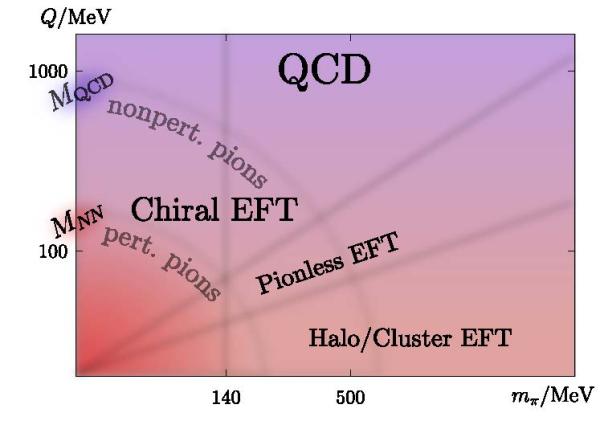Chiral EFT: New Perspectives

Event ID: INT-25-92W
Note: This is a 1-week in-person workshop to take place March 17 - 21, 2025.
Description:
We are at a dramatic point when nuclear theory has an opportunity to shine and impact other areas. Recent advances in astrophysics and particle physics now require nuclear input at precision levels not seen before.
The development of effective field theories (EFTs) and "ab initio" many-body methods (AIMs) over the last three decades or so has provided an exquisite description of many nuclear observables, but also exposed significant problems. The most popular approach follows the original prescription by Weinberg, where the nuclear potential is expanded in the same way as amplitudes in Chiral Perturbation Theory, and the potential truncated at some order is solved for exactly to produce nuclear amplitudes. Unfortunately it is now known that this approach produces unrenormalized nuclear amplitudes. Moreover, AIMs have reached such a level of sophistication that they now expose various shortcomings of the interactions they use as input, such as instability at LO beyond the alpha particle, the need of high orders for a good description of light nuclei mostly through the delicate adjustment of short-range interactions rather than pion exchange, difficulties to simultaneously describe light and medium-mass nuclei, and nuclear-matter saturation only when three-body forces are included at subleading orders. These issues impact our ability to provide reliable input to experimentally significant process, such as neutrinoless double-beta decay, where renormalization of Chiral EFT (and of Pionless EFT alike) requires a short-range parameter at leading order.
We can only rise above incremental improvements on these issues by bringing together a group of experts of the various subcommunities --- EFT, nuclear forces, AIMs, "users" --- all committed to this research program. The aim of the workshop is to provide a critical evaluation of the current stage in the development of Chiral EFT, and catalyze an effort to improve it at a foundational level --- in particular:
- Review the renormalization problems of Weinberg's prescription and existing efforts to build a power counting consistent with renormalizability.
- Review the phenomenological challenges of Weinberg's prescription and attempts to overcome them (Delta isobars, optimized fits, phenomenological promotion of certain interactions, etc.).
- Discuss the next steps needed for the development of consistent power counting, including few-body forces and currents. This includes building on the expertise from simpler EFTs, such as Pionless EFT.
- Identify what is needed for the calculation of nuclear observables order by order --- in particular the development of AIMs tailored to EFTs, with reliable renormalization behavior and controlled systematic uncertainties.
- Discuss strategies for the determination of lowest-order parameters.
- Deploy EFT methods to gauge the convergence of the expansion.
Note: There is no registration fee for this event.
